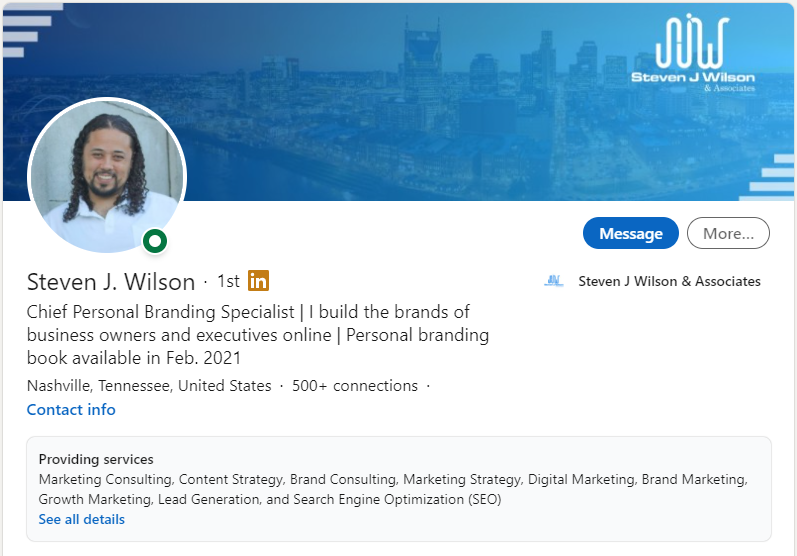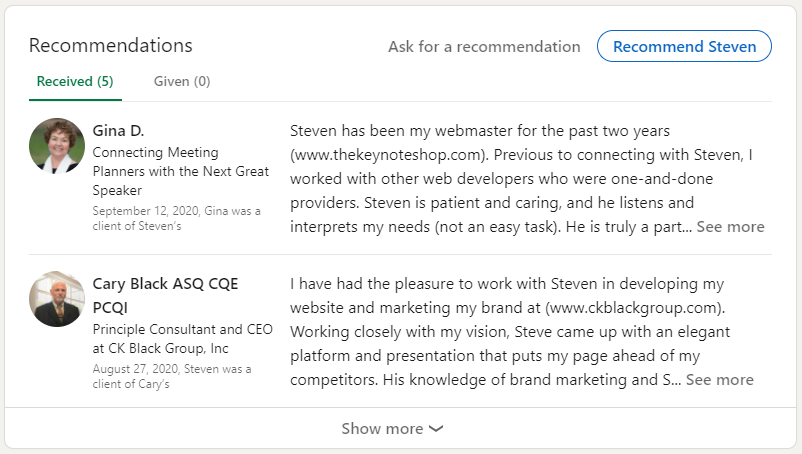In a competitive job market, we’re always told to leverage our education, experience, and skills to stand out from the crowd.
But how do we exactly present all these in a way that will win the attention of hiring managers?
If there’s one career advice you need, it’s to start working on your personal career branding.
In this guide, learn what a personal career brand is and how it can help you in your job search. Also, learn how you can build a strong personal brand that can help you move toward career fulfillment.
What is a Personal Career Brand?
A personal career brand defines who you are as a professional.
While your resume tells your story, your personal branding shows your character development. It sums up your goals, skills, expertise, and core values at work.
For job seekers, it is how you present yourself as a potential hire.
Personal career positions you in the professional world in a way that makes you stand out. It is one way to advance your career and move toward work fulfillment.
Thus, it has become an integral part of a job search today.
In the next section, discover how managing your personal branding exactly helps you land that coveted job.
How a Personal Career Brand Benefits You
Savvy job seekers know that personal branding is part of a healthy career. They understand that it is an ongoing process of painting a professional image, which ultimately, can benefit them in the following ways.
Improve visibility
When it comes to job search, 92% of recruiters use social media to find potential hires, and 87% of these leverage LinkedIn.
That said, having an online presence on LinkedIn can help you get found.
Your personal brand positions you as an expert in your field. It lets you speak, write, and share your knowledge on platforms where your audience spends their time.
When communicated strategically, personal branding cuts through the competition and gets you in front of recruiters.
Thus, successful career branding increases your visibility online.
Communicate value to hiring managers
Once you get found, your brand now works to move you through the next step of the hiring process.
Hiring decision-makers need help knowing how you position yourself as a professional.
Your brand helps them understand your character. It tells them what you’re like to work with and how you do things your way.
Personal branding also helps recruiters to understand what you have to offer that only you can do.
Make the hiring decision easier
After communicating your value, it’s time for the recruiters to decide.
Your brand makes it easier for recruiters to evaluate you as a potential hire. It can signal whether you’re a good fit for the role and whether to hire you or partner with you.
But the benefits of career branding don’t stop there.
Find career fulfillment
If you pass the screening, you’re finally getting hired.
Remember that you have positioned yourself as an expert in the field. You have effectively communicated the value you offer that only you can do.
As you establish yourself as a valuable addition to the team, this allows you to set premium rates that work for you.
Not only do you land your “dream” job, but you are also getting a good job that pays well and fills you with a sense of purpose.
And a strong personal brand can make all these possible.
How to Build Your Personal Career Brand
Having a strong personal brand offers plenty of advantages for job hunters like you. If you want to reap these benefits, it’s time to start branding yourself now.
Here, we’ll walk you through the process of personal branding. Learn what you need to do to position yourself in the professional world so you can land that new job you dream of.
Define your goals
Your personal brand may be a reflection of who you are today, but it is also a roadmap of who you want to be in the future.
Determine where you want to end up five or 10 years from now.
Do you want to get hired for a certain role? Do you want to advance your career in your current organization? Do you want to be a business partner?
Define your goals and set a realistic timeframe to accomplish them.
Find your strengths and weaknesses
In which areas do you excel? What are you passionate about? Which tasks do you spend time on without feeling overwhelmed?
Assess yourself and find out who you are as a professional individual. List your strengths that you can help your audience with.
Those strengths are what make you stand out from the competition. Those can be the value that you uniquely offer.
Don’t forget to identify your weaknesses, too. This includes tasks that you need help with repeatedly or roles that drain your energy.
Once you’re done with your self-reflection, gather feedback from other people as well. They can be your colleagues, friends, and family.
You might be surprised to learn your strengths and weaknesses from an outside perspective.
Determine your audience
Who are you trying to reach? Are they fellow industry experts? An individual at a specific company? Recruiters?
Depending on your goals, you need to target a specific audience to communicate your value.
Defining your audience also allows you to determine the right platform and type of content you need to create.
Create a statement
Now that you know your value and the audience you’re targeting, it’s time to create your statement.
A personal brand statement is a concise story about who you are. This elevator pitch should be 30- to 60-seconds long and answers the following questions:
- What problem do you solve?
- How do you do it?
- Who are you trying to help?
Your statement is the first thing that recruiters will see when they check your brand, so make sure it is memorable and effective.
When making your statement, focus on a few key points you want to emphasize. Make sure that it is directed to your target audience, and that you stay authentic.
Develop a strong LinkedIn presence
Once you have your statement, it’s time to build your online presence.
As we explained above, LinkedIn is a vital platform for job hunters to establish their presence.
To do this, set your LinkedIn profile first in a way that highlights your value. Feature industry terms in your profile and emphasize your key qualifications. Include your accomplishments and don’t forget to add a professional photo.
Here’s how I did my LinkedIn profile to give you an idea.

After setting your profile, follow people of relevance to your branding and engage with them. Also, participate in groups to further grow your network.
Create or update your personal website and blog
Aside from LinkedIn, it’s also important to have an updated professional website and blog.
A website is an excellent way to showcase your portfolio, especially if you’re in the marketing or design industry. Also, it can be used to house essential information about yourself and highlight your work.
Likewise, a blog is also an important platform to build your presence online. Writing blog posts about your expertise on a regular basis helps boost your authority. This is especially true when you’re following SEO tactics to expand your reach.
Strategic networking
A network is an essential part of successful personal branding.
Research your industry for thought leaders you can connect with. Follow these experts and engage with them.
You’ll be surprised how a simple comment on other people’s posts can go a long way in LinkedIn.
Also, find other platforms these experts use like personal blogs and websites. Then, interact with them.
The more connections you make, the more people will recognize your branding. Just make sure that you provide value every time you engage with these professionals.
Ask for recommendations
Just like how businesses use reviews and testimonials to build credibility, recommendations can help you gain the trust of recruiters.
Ask for recommendations from current and former colleagues to establish your personal brand. You can ask previous managers who handled you closely as well as leaders of organizations you belong to.
LinkedIn has a particular feature that is helpful for asking for recommendations.

Having recommendations on your LinkedIn profile is a great way to capture the attention of your target audience. So, make sure to ask for one.
Volunteer on important projects
If you feel like you are lacking the experience to boost your reputation, start doing helpful projects when possible.
Identify activities relevant to your chosen niche. These should be roles that will help position yourself as an expert in your field.
For instance, if you are a writer who wants to be known for his SEO expertise, volunteer doing guest posts in SEO-focused blogs. The more reputable the blog is in the industry, the more recognition you will get from your peers—and the more you will be recognized by hiring decision-makers.
Remember your goals and determine the activities that will help you get there.
Grow your skillset
A personal brand needs to evolve throughout your career.
To do this, you need to be up-to-date on new skills in your industry.
For example, digital marketing is an ever-changing landscape. Social media platforms come and go. Strategies that are relevant today might suddenly become irrelevant tomorrow.
It’s important that you keep up with the skillset needed in your industry.
Fortunately, there is a wealth of resources available online to grow your skills. Make sure to take online classes, get helpful certifications, and utilize company learning programs to further establish your brand.
Track your progress
Finally, like all other processes, you need to monitor your success.
To measure your success, you have to set some metrics. This includes your number of connections/followers, comments on your posts, page visits, and mentions of your name online.
Track your progress against your set timeline to ensure your brand is headed in the right direction.
Things to Avoid When Building Your Personal Career Brand
Aside from learning the things you need to do, you should also be aware of the common pitfalls of personal branding. Watch out for these mistakes that can hold you back from attaining branding success.
Getting too personal with your brand
Just because it is YOUR personal brand, you’d have to get too personal with it. Personal branding doesn’t work that way.
While posting personal information can help show authenticity, draw the line on what you will share with your audience.
Before posting content, ask yourself this: “Will this truly help build the image I want my followers to see in me?”
If you decide to share personal details with your audience, always tie them back to your goals.
Getting overly promotional
On the other hand, personal branding isn’t just about marketing yourself.
Remember that a personal brand isn’t shameless self-publicity. It’s about educating your audience on how you can be of value to them.
Personal branding also involves communicating your purpose, values, vision, and motivations. It also lets you discover more about yourself, hence, it is also a personal development tool.
That said, be sincere about helping your audience learn more about you while developing your professional self.
Not preparing for the tough questions
Say, you’re undergoing a career change.
Are you prepared enough to answer questions about taking a new path? Can you explain how your current skill set relates to the new role you’re aspiring to? Or how your passion translates to your goals of shifting to a new field?
Your personal brand must answer the tough questions to help the hiring decision-maker to understand your position.
Getting too comfortable
As we move on in the personal branding process, we tend to get too comfortable after completing the first steps.
Sure, you have set your profiles in place. Also, you have published your first posts, and you have your strategy rolling.
Now, you think you’re all set and everything will go well.
Don’t just stop there.
While you did great with all those works, remember that personal branding is a continuous process. And most of the time, a learning process.
Continue doing what’s necessary, assess the performance of your strategy, and adjust as needed. With perseverance, you’ll eventually reap the rewards of your hard work.
Losing focus
Before reaching your goals, you will be facing lots of twists and turns.
You may find yourself accepting activities irrelevant to your goals just so you can pay the bills. Or you may get disheartened with your slow progress.
The important thing is to stay focused. Remind yourself of your goals. What do you want to achieve, and why are you doing it?
Set some milestones, track your progress, and keep your eyes on the destination.
Final Words
With a strong personal career brand, you are boosting your chance of standing out in a competitive job market.
You get to improve your visibility, communicate your value to recruiters, and make the hiring decision easier. Ultimately, personal branding moves you toward career fulfillment.
If you need help in your job search, take the career advice above and start building your brand today!





